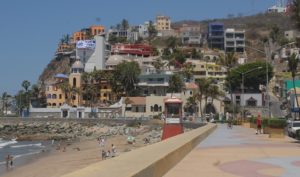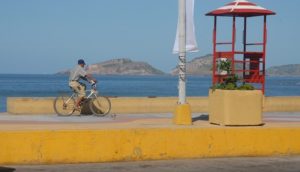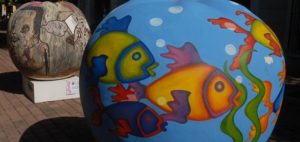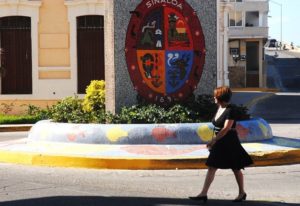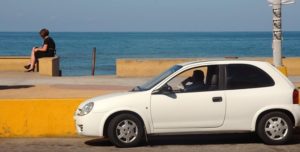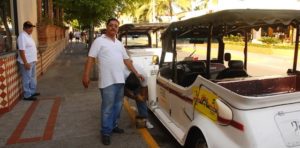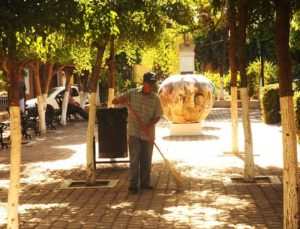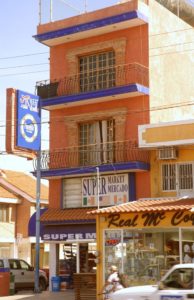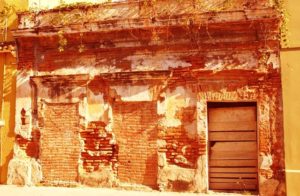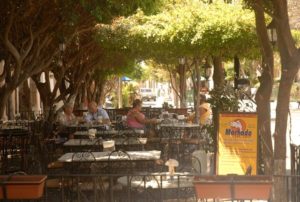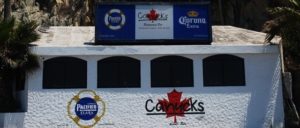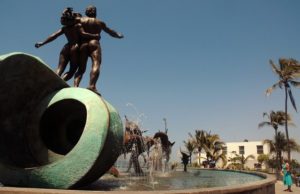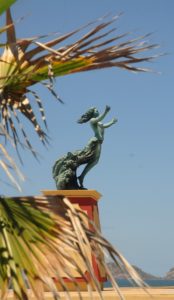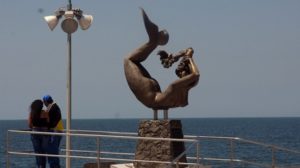The Months of Mexico
Mazatlan has the virtues and vices of any tourist destination. But all the bad stuff – or good, depending on how you plan to spend the evening – is buffered by the decency and solidity of a working town.
Unlike the hotel cities dreamed up by governments beholden to tourist dollars, Mazatlan, the second city of Sinaloa State, after Culiacan, has been around virtually forever, in one form or another. Today it takes on two personas, that of a beach and bar destination and of a commercial hub and home to about half a million people.
It’s more a family town than a tequila town, although tipping back the national drink is not confined only to the two-week tourist. Mexicans do it too, but mostly with significantly more restraint than the fly-in vacationer from the north or from further afield.
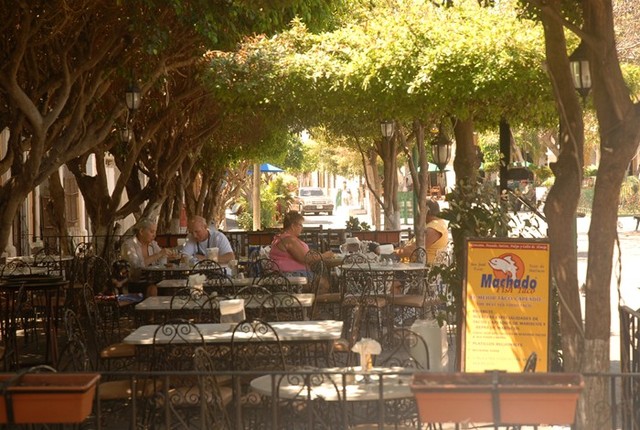
Late in 2008, and early in our annual immersion into the months of Mexico Vera and I rented a space in a recreational vehicle park near the Zona Dorada, but far enough away to dismiss the clamour of revelry, the blandishments of timeshare predators, the exhortations of waiters and the constant refrain of street-side hawkers. As snowbirds and atypical tourists, we eschewed the doubtful diversions of the Gold Zone, and instead burnished our zeal for the charming ordinariness of a busy Mexican city. We had with us Frida, a Westfalia campervan of great age but surefooted nimbleness and with the stormy temperament of her namesake, Frida Kahlo, Mexico’s first lady of art.
We revelled in the brawling activity of Camaron-Sabalo, the tourist district’s frenetic four lane main street which bursts gaily into this north end of Mazatlan from the El Centro area, and from an equally boisterous Avenue Rafael Buelna, the no-holds-barred thoroughfare bleeding traffic from the main highway to Guadalajara.
Camaron-Sabalo flaunts its gap-toothed sprawl of hi-rise sea view hotel rooms, exhaust-smoke roadside restaurants, quick-trip sidewalk booby traps, white clad hotel workers and uncertain thin-tanned tourists. It is a conduit of commerce as well: hopeful taxis prowl the curbs, fume-engulfed buses clog the lanes, cars and trucks dash from light to light, practised pedestrians flirt with catastrophe, and sanguine cyclists weave through the maelstrom. Everywhere the pesky, canopy clad pulmonía taxis buzz and dodge, their little Volkswagen engines whining busily as they collected sightseers, tourists or businessmen in a hurry. (El Centro? Twenty pesos.) And we just smiled with delight at being there.
Mazatlan seems as Mexican as it can get. It has its share of fulltime and semi-permanent North Americans, along with a smattering of Europeans who chose this city over the U.S.-Canadian enclaves of Chapala-Ajijic, Guadalajara, Puerto Vallarta, San Miguel de Allende and, of course, Mexico City. Save for the usual number of cloistered and perhaps insecure foreigners, most non-Mexicans here appear to integrate well into a city which can absorb the dispersed whites without identifiable discrimination or suppressed hostility. It is clear that in some locales, Ajijic, Jalisco, being one, resentment over the years has emerged among some towards the seeming omnipresence of the “gringo”. Their numbers in some communities have highlighted the gap between the rich outsider and the poorer Mexican, although arguably just being white doesn’t make one rich and being brown doesn’t denote poverty. Nonetheless, these communities in some ways are transformed by the amounts of money that are being spent, if not necessarily simply by the numbers of people who spread their wealth. Stories crop up of “rich” homes being looted and trashed when left unattended, particularly in places such as the Lake Chapala area where the mark of gringo affluence is starkly visible to anyone driving or walking along some streets.
In the eight days we spent in Mazatlan we heard reports such as that, and we listened as well to tales of contentedness.
Divergent Stories
These divergent stories came from five men whom we met casually. Three were Americans who more or less were immersed in Mexican culture, another was a U.S. traveller from Rhode Island who was wandering more or less aimlessly around Mexico and the fifth was a Fijian-Indian working in Mexico. In some ways their deportment, their varying equanimity and their attitudes as reflected by their disparate views are archetypal of the foreigner in Mexico.
We met Lance, a Vietnam veteran fragile and thin as an arrow but stocked with a surplus of hopefulness and good spirits notwithstanding having to bear the burden of leukemia, an affliction which was traced to his toxic tour of duty in Asia.
At our RV slot, we found another Westfalia aficionado. Skip was a buoyant 72-year-old Rhode Islander hampered for the time being by a cast protecting a broken ankle suffered when his self assurance over-reached his nimbleness in an ill-advised leap onto a rock at the beach. Dry for more than 20 years, he is an alcoholic who lived – as is the mantra of these stalwart optimists – day-to-day. “I can drink tomorrow,” he told me with a smile. “But I can’t take a drink today.”
Chuck is a blustery and narrow heavyweight from Montana who was married to a Mexican woman. He lives in a barrio and possesses an unsavoury inventory of observations about the proclivities of his neighbours and the disposition of Mexican people in general. He is a big guy. “I lost 60 pounds since I moved here,” he said. “I was huge at home. No woman wanted me.” So he came to Mexico and found one who did.
Jack, Chuck’s Mexico friend, is an Alaskan whose views towards his host country were much more charitable than those of his companion as expressed at a table where we had joined them for a conversation during a prowl of the malecón, one of those clamorous arteries of commerce which parallel the beaches on oceans and inland lakes alike. He served as a good-natured foil to the denunciations of his fellow countryman.
James (Jagindar) had immigrated to the U.S. from somewhere in Europe. Originally from Fiji, James was running a five-table side street restaurant half a block from Camaron-Sabalo. An exuberant sort with skin black as burnt toast and brimming with unattainable ambitions as grand as the Dark Continent, James is a free spirit with muscular self-assurance, bearing a perpetual smile and with ready cash in his trousers. He represents the best of those rare itinerant souls who could thrive almost anywhere. He drove a spick ‘n span Mercedes.
In some ways, these five men dominated our stay in Mazatlan. We saw them often.
Lance
Lance was like a shadow. We had met him on one of the band aid buses shunting back and forth from the hotel zone to el centro. He had struck up a conversation with us, leaning across the aisle, chatting, pointing with reed-like fingers at the passing landmarks. Back home in Las Vegas he had married a Mexican national, his maid then, and they moved to Mazatlan where his veteran’s pension would hold out longer. He showed us old town Mazatlan where gradually the grand old buildings were being restored, some reinventing themselves as apartments or homes, and others, such as the opera house, getting official sanction and formal fundraising.
During ensuing days we encountered Lance everywhere, always by chance: He was a wraith, dissolving and reappearing. “Hi, Gerry,” I heard from somewhere behind me. I gazed about, trying to identify the voice and location. There he was, waving from the third storey landing of his apartment block. Thin as Lance, the building rose from the pavement, the tallest structure among stocky supporting actors.
In the din of downtown I would hear Lance’s cry: “Hallooo, Gerry.” We ate at the top-floor restaurants at the bustling public market. We wolfed-down chiles rellenos, one of our favourites, washed down with delicious chilled Pacificos. Lance sucked on a Coke, and chain-smoked. I admonished him about the Cokes. “Do you know that each one of those contains the equivalent of eight spoons of sugar,” I said. “Or worse,” said Vera. “It’s sucralose or some other chemical sweetener.” Most likely it is the pervasive high fructose corn syrup, sure to put you on the road to diabetes. I didn’t dare mention the cigarettes: That would be cutting it too close to his leukemia.
We were returning from the optometrist’s, and there was Lance coming around the corner. Or we’d emerge from a building, and Lance would be lounging outside, a gaunt smiling spectre. The three of us would stroll to a sidewalk cafe for a mid-afternoon beer. He said Mexico was an agreeable place and here his veteran’s benefits went further, and he liked the people. He could take the bus or walk every day and see something different. Although he did not articulate it, I sensed that he took joy in every sunrise, seeing each one as a surprise gift. He was an amiable companion, stalwart but not resigned. He had learned to live with the poison swirling in his blood.
There are countless people who came to Mexico and are cradled in its bosom. Many live out their later years in Mazatlan, Ajijic, San Miguel and other more remote places. Some go “home” to die. Some stay forever.
Chuck’s Warnings
Chuck was like his no-nonsense name, strong, burly and brusque. Vera and I had been trolling the streets of old town, looking for apartments potentially to lease the following year. After several seasons of renting in Melaque, we were considering changing our base of operations. Mazatlan seemed a good option with its diversity of people, its self-assurance, its bustle and, important to us as it is for many ex-patriots, the presence of a contingent of North American nationals. (You’re most comfortable with your own, you know….)
We aren’t hesitant about chatting to strangers who might have useful information to offer. “Hi,” I said to a couple of men sitting in front of their coffees at a restaurant table on the malecón. “You guys look like you know your way around here.” (That’s my standard introduction: I’ve said it a hundred times or more.) After I made known my quest, Chuck and Jack invited us to join them.
Chuck wasn’t one to chew his food before swallowing. And his opinions were processed the same way, in indigestible chunks.
“This is the drug capital of Mexico,” he said, incorrectly. “They’ll kill you. They’ll cut your head off.”
I protested that aspirin is the strongest drug that I take and it’s unlikely that I would ever come into contact with the cartel.
“Doesn’t matter,” he said. “There’s guys here that’ll kill you for your wallet. Druggies. Friend of mine was walkin’ down the street, broad daylight. Got cold-cocked with a big beer bottle, one of those ballenas. Broke his jaw, teeth flying everywhere.”
Jack rolled his eyes. He’d heard the mantra before, perhaps different lyrics but the same tune. I just listened.
“You want to live here.” Chuck announced. “You got a car?” I nodded. “If you leave it in the street, they’ll steal it.”
“Nobody would want to steal an 18-year-old Westfalia camper van,” I said.
“Oh, yeh? And if they don’t steal it, they’ll steal your tires. They’ll punch out the windshield. They’ll take the engine.”
Chuck’s eyes were bulging and his biceps were quivering. (Just an excitable boy!) Meantime, Jack was razzing him about his failure to acknowledge the true side of Mexican society.
“Well,” I wavered. “I didn’t say for sure we were going to live downtown. We’re just checking it out.”
Chuck shook his head. What a dummy, he was thinking.
Jack gazed at his friend with bemusement. He liked Chuck but you could see that he thought that sometimes he was a dummy.
I have encountered Mexico “Chucks” all over the country. They’ve suffered some misfortune and therefore condemn all Mexicans, and certainly they knew many people who have been victims of theft, housebreaking and sometimes even violence. But their gruesome details overstate their case and undercut their thesis: Mexico has proved to be not a place of pillaging and ravaging; instead to those of us who live in relative comfort in good neighbourhoods it is a place of relative serenity and security. The alarmist arguments of the Mexico Chucks are denounced by the uncompelled presence of these naysayers in their imagined land of fear and loathing: if things are as undesirable as they claim, how come they volunteer to stay?
A Younger Man
Jack, who’s about 35 but with the world-weary eyes of a canny elder, works in Alaska when he has to. He’s got a lifestyle routine: whenever his cash runs low he heads north to accumulate a grubstake. He spends a season pulling fish from the deck of a troller, seiner or trawler and, with a replenished bank account puts his gear in storage, packs his shorts and t-shirts and takes a plane to Mazatlan where he has an apartment.
Jack’s in tough at the moment. He admits it. “I’m running out of money,” he says. It’s time to go north, time to shore-up the bank account.
With his wry smile, occasional shrug of his spare shoulders, he’s an easy going guy. “I do this all the time. I don’t like having to go back to Alaska, but that’s the way it is. If I could, I’d stay in Mexico fulltime.”
Staying here year-round forever may not be an option: unlike most retirees, he doesn’t have the bulwark of a company pension, or a home to sell. But you have the idea that somehow he’ll make do with the little he’s got.
Mexico embraces these outsiders, no questions asked as long as they don’t make themselves into a nuisance. Obey the laws and lay low.
Entrepreneur
James the Indian-Fijian is poised and proud. Coal bright eyes burning in his charcoal face exude self-assurance. He said he owned a small manufacturing plant in the States, employing several people and making good money. Serving up a 35 peso meal – carne asada, frijoles, salsa fresca, sparse salad, hot tortillas, all cooked by a cheerful ample Mexican woman – he spreads his arms in a flourish, taking in his modest outdoor restaurant with its simple open kitchen and five tables surrounded by plastic chairs. He owns two freezers, he says grandly as though he was describing vast hacienda holdings. And he gets the best wholesale prices in town, because, he says, he tells his supplier to be honest with him and he’ll be loyal in return. He has inherited the canny business sense of dislocated Indians all over the world, as well as their capacity for unassuming assimilation into new societies. “I can make two, three hundred dollars a day,” he says in a probable overestimation. “Why would I want anything more?”
He enjoys new girlfriends, a good job, independence, his spic ‘n span Mercedes, his adopted country. Unlike Chuck, he extols the virtues of Mazatlan. He only hints at the vices, but then he’s single….
With an FM3 in his jeans and with his cheery determination, James can harvest the economy with ease. He just happens to be doing this in Mazatlan, but anybody talking to him senses that this charismatic entrepreneur could succeed anywhere on the planet based on parameters set by his own soaring ego. And he probably will. Mexico may be just another stop in his merry peregrinations.
In the dust and cobbles of Mexico, advantage exists everywhere for the ingenious and the enterprising. There may not be much low-hanging fruit left for the picking, but Mexico still is a land of opportunity for those who can open their eyes and see.
A Wanderer
At 72, Skip is an unlikely wanderer, especially with the ankle cast hobbling his progress. But just as he stoically accepts and daily conquers his alcoholism, he will overcome this temporary impediment. Although he is in Mazatlan for the time being, his objective is Guatemala where his daughter will be vacationing. From Rhode Island he could have driven straight through Texas and along the shores of the Gulf of Mexico, in a more or less straight line, but he chose instead the delight of meandering. A retired architect who enjoyed a splendid career after quitting the bottle, Skip was seeing a slice of the Mexico that escaped most visitors. Travelling some of the back roads in his sprightly Westfalia, he good-naturedly accepted the minor tribulations that come with the pursuit of the uncommon. It is in the quest for the memorable that we find magic. And just as he defeats his alcoholism one day at a time, he is seeing Mexico one day at a time.
There are different views of Mexico, as diverse I suppose as the numbers of observers. Not all of Mexico is roses and champagne, nor is it thistles and pain. If we were likely at home to gripe and moan, we would sound the dirge wherever we went.
Those others of us who seek the sun take Mexico one day at a time. It is the best way to travel.

